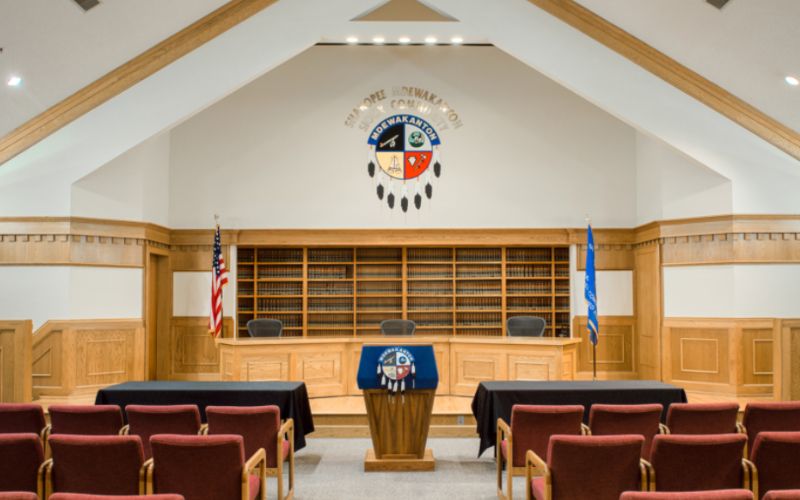
- Details
- By Native News Online Staff
A new legislative initiative aimed at enhancing the efficiency and effectiveness of tribal courts was introduced on Monday by Representatives Ilhan Omar (D-MN), Sharice Davids (D-KS), and Raúl Grijalva (D-AZ). The proposed Tribal Courts Support Act seeks to address persistent issues within the current system, which have resulted in delays and inefficiencies in the establishment and funding of tribal courts by the Bureau of Indian Affairs (BIA).
The Tribal Courts Support Act proposes a more efficient assessment process conducted by the BIA’s Office of Tribal Justice Support (TJS), distinguishing between the assessments needed for establishing new tribal courts and those required for additional funding of existing courts. Additionally, the act mandates a review by the Government Accountability Office to recommend improvements to better address the diverse needs of tribal communities.
“Tribal justice systems are essential to tribal sovereignty and public safety in Indian Country,” stated Rep. Omar. “This bill will remove unnecessary administrative barriers and expedite the process for tribes to establish and strengthen their courts. It’s a crucial step towards supporting tribal self-governance and ensuring that tribes have the resources they need to keep their communities safe.”
Rep. Grijalva echoed these sentiments, emphasizing the importance of tribal courts in self-governance and public safety. “The Tribal Courts Support Act would improve the tribal court assessment process, making it more efficient and accessible for tribes. I applaud Congresswoman Omar for her leadership on this issue and thank her for her partnership in ensuring that unnecessary administrative burdens are no longer a barrier in tribes’ ability to keep their communities safe,” he said.
Rep. Davids highlighted the long-standing administrative challenges faced by tribal courts, stressing the need for the proposed changes. “Tribal courts are vital to ensuring justice and safety within Native American communities, but they have long faced unnecessary administrative hurdles,” she remarked. “The Tribal Court Support Act would streamline the process for establishing and funding these courts, ensuring they have the resources necessary to better support tribal sovereignty and public safety. I’m proud to join my colleagues in this important effort.”
The National American Indian Court Judges Association also voiced its support, citing recent federal commissions’ reports that underscore the importance of adequate and flexible funding for justice in Indian Country.
"Tribal courts are vital for ensuring the well-being and long-term success of Native American communities," the association stated in a press release. "Recently, two federal Commissions, The Alice Spotted Bear and Walter Sobleff Commission on Native Children and the Not Invisible Act Commission, released reports that speak to the importance of mandatory funding that is both adequate and flexible as integral to support justice in Indian Country. In part, because funding is tied to the Act, the process for tribal court assessments should be timely, efficient, and culturally responsive. This bill is one step in the right direction for the federal government to uphold its trust responsibility."
By addressing the inefficiencies of the current “one-size-fits-all” assessment approach, the Tribal Courts Support Act aims to better cater to the unique needs of diverse tribal courts. The bill’s focus on expedited assessments for new courts and a review of the funding process intends to serve the varied needs of tribal communities while respecting their individual histories, cultures, and traditions.
More Stories Like This
NCAI Passes Two Emergency Resolutions on Immigration Enforcement ActivitiesChickasaw Lighthorse Police Officer named Indian Country Law Enforcement Officer of the Year
Indian Gaming Association Rallies Broad Coalition Against Sports Event Contracts It Calls Illegal Threat to Tribal Sovereignty
Navajo Resources and Development Committee Issues Notice on Livestock Inspection Requirements
American Prairie, Tribal Coalition Files Protest Over Rescinded Grazing Rights
Help us defend tribal sovereignty.
At Native News Online, our mission is rooted in telling the stories that strengthen sovereignty and uplift Indigenous voices — not just at year’s end, but every single day.
Because of your generosity last year, we were able to keep our reporters on the ground in tribal communities, at national gatherings and in the halls of Congress — covering the issues that matter most to Indian Country: sovereignty, culture, education, health and economic opportunity.
That support sustained us through a tough year in 2025. Now, as we look to the year ahead, we need your help right now to ensure warrior journalism remains strong — reporting that defends tribal sovereignty, amplifies Native truth, and holds power accountable.
 The stakes couldn't be higher. Your support keeps Native voices heard, Native stories told and Native sovereignty defended.
The stakes couldn't be higher. Your support keeps Native voices heard, Native stories told and Native sovereignty defended.
Stand with Warrior Journalism today.
Levi Rickert (Potawatomi), Editor & Publisher

